Review: THE SECRET LIVES OF BABA SEGI’S WIVES, Arcola Theatre
Photo credit: Charlie Flint
Based on a book discovered by the play’s director Femi Elufowoju jr at a bookstall under Waterloo Bridge, The Secret Lives of Baba Segi’s Wives is a portrait of life in a Nigerian family in Ibadan. Baba Segi has multiple wives, as befits his status and prosperity as he sees it. He has traditional attitudes and expects obedience and subservience from his wives and children. Some of his wives, however, have other ideas.
Lagos-based Lola Shoneyin’s book, her third novel, was written in 2010 and reflects her own family history, her grandfather having had five wives. The book has been sensitively adapted for performance by Rotimi Babatunde. The current production is a revival and was first seen in Nigeria in 2013 and at the Arcola in 2018.
Some of the cast were in that earlier Arcola production, but all seem totally at ease with what is essentially an ensemble piece. A great strength of the production is the choral singing, arranged by cast member Ayo-Dele Edwards, which greatly enhances the play. In what is essentially an attack on the overarching patriarchy of much of Nigerian society, the writer has created a range of strong female roles. All are well played, but there is a particularly heart-rending performance from Kemi Adekoya as the first and senior wife Iya Segi. Various male roles are well delineated by Ayan de First (particularly as the teacher whom Baba still respects) and Usifu Jalloh (memorable as Baba’s driver).
Much of the conflict in the play, and the driver towards its resolution, is fourth wife and university graduate Bolanle. She is also the character who chooses to walk away from the system into which she had been drawn, and stands perhaps for the future of Nigerian women.
In the title role, Patrice Naiambana is appropriately commanding but then increasingly bewildered as his comfortable life is challenged and his masculinity seems to be doubted. It is a towering performance, but Naiambana is impressive too as the shattered man at the end of the play. It is a mark of how much we believe in him as Baba Segi that he has to break the fourth wall at one point when he tells us he will, for a short time, be playing a different character.
Baba Segi is also at the centre of the riotous scene at the fertility clinic which closes the first half. The second act is much shorter, but it is clear that the interval could only come after what can only be described as the climax of that scene.
Elufowoju’s production is played in the round at the Arcola. Costume designs (Ultz/Shola Ajayi) help to create the Nigerian context (as do the cloths on the tables in the Arcola bar) but the only scenic element is a ceiling fan. Music is accompanied by various West African instruments, including Naiambana playing various pipes and kalimba (thumb piano). Drumming is an essential part of African music and the production benefits greatly from the talking drums of Ayan de First.
Anyone unfamiliar with the Nigerian accent may miss some of the asides and implications, but that is no reason to miss this fascinating account of a lifestyle now very much under challenge by African women. It’s also very funny, beautifully sung, and cleverly involves the audience in the action at various points.
**** Four stars
Reviewed by: Chris Abbott


